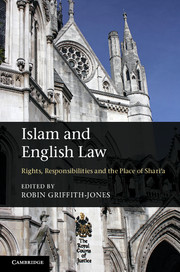Book contents
- Frontmatter
- Contents
- List of contributors
- List of abbreviations
- Preface
- Introduction
- Part I The Archbishop of Canterbury and shariʽa law
- Part II The Archbishop’s proposal for ‘transformative accommodation’
- Shariʽa and secular democracy: is Islamic law compatible with the European Convention on Human Rights?
- 3 The Refah case at the European Court of Human Rights
- 4 The compatibility of an Islamic/shariʽa law system or shariʽa rules with the European Convention on Human Rights
- 5 An analysis of the relationship between shariʽa and secular democracy and the compatibility of Islamic law with the European Convention on Human Rights
- 6 Dignity and religion
- Legal pluralism: should English law give greater recognition to Islamic law?
- Accommodation or conflict: trajectories in the United Kingdom
- Part III Responsibilities and rights
- Part IV Prospect: equality before God and before the law
- Select bibliography
- Index of cases
- Index
- References
4 - The compatibility of an Islamic/shariʽa law system or shariʽa rules with the European Convention on Human Rights
Published online by Cambridge University Press: 05 April 2013
- Frontmatter
- Contents
- List of contributors
- List of abbreviations
- Preface
- Introduction
- Part I The Archbishop of Canterbury and shariʽa law
- Part II The Archbishop’s proposal for ‘transformative accommodation’
- Shariʽa and secular democracy: is Islamic law compatible with the European Convention on Human Rights?
- 3 The Refah case at the European Court of Human Rights
- 4 The compatibility of an Islamic/shariʽa law system or shariʽa rules with the European Convention on Human Rights
- 5 An analysis of the relationship between shariʽa and secular democracy and the compatibility of Islamic law with the European Convention on Human Rights
- 6 Dignity and religion
- Legal pluralism: should English law give greater recognition to Islamic law?
- Accommodation or conflict: trajectories in the United Kingdom
- Part III Responsibilities and rights
- Part IV Prospect: equality before God and before the law
- Select bibliography
- Index of cases
- Index
- References
Summary
Introduction
One day there was a student at one of our famous universities who was sitting in front of an examination paper. Unfortunately he couldn’t answer any of the questions. So he began his essay: ‘I’m terribly sorry, I don’t know the answer to any of these questions; but here are some questions I do know the answers to,’– and then he proceeded to write the answers. For this chapter, the question posed was ‘whether an Islamic/shariʽa law system would be compatible with the European Convention on Human Rights (ECHR)?’ I am in a more fortunate position than the student, because I think I know the answer. The answer is ‘No’. Or, if one is being really diplomatic, at least generally ‘No’.
The challenge
The challenge that lies behind the question is clear to all. The numbers, visibility and demands of Muslims are growing as Europe is ‘once again becoming a land of Islam’. What should be the place of Islam in the many European states that now contain significant and permanent Muslim minorities? Calls for a greater degree of recognition for shariʽa law can be seen as a reaffirmation of Islamic identity. Are Muslims to be considered different or unique as compared to other minorities, religious or otherwise? How should Muslims be positively accommodated and integrated within European states? Should it be by the general adoption of a shariʽa system or just of particular substantive or procedural rules? Alternatively, should there be more opt-outs from generally applicable laws for religions generally or for Muslims in particular, and, if so, on what principled basis? What implications would more opt-outs have for the accommodation of other religions and non-religious beliefs? Are these questions more comprehensible than the general question of compatibility and, therefore, ones that might attract better answers?
- Type
- Chapter
- Information
- Islam and English LawRights, Responsibilities and the Place of Shari'a, pp. 42 - 71Publisher: Cambridge University PressPrint publication year: 2013
References
- 2
- Cited by



